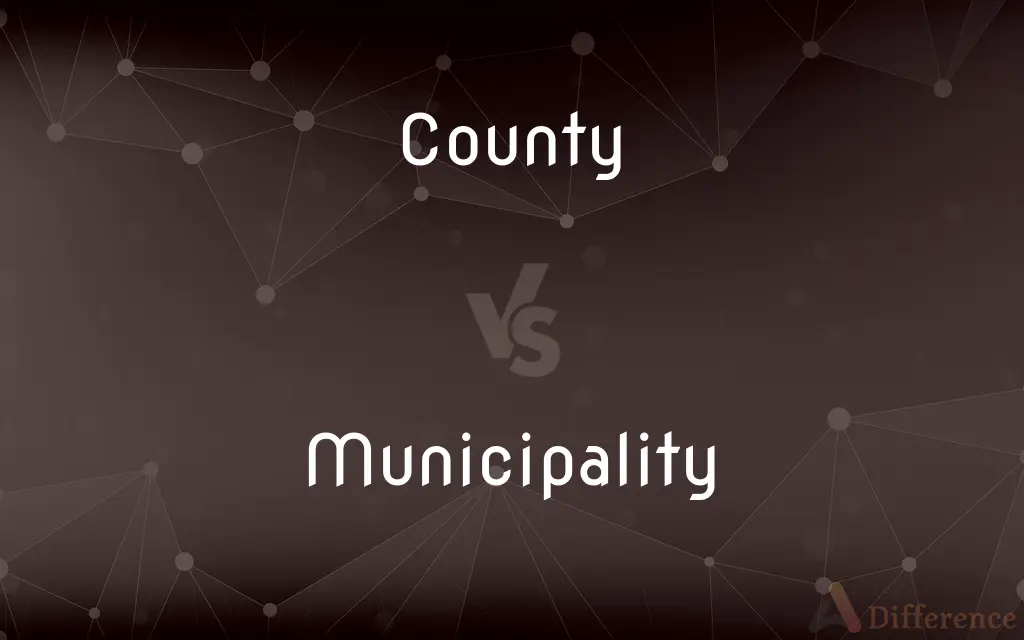County vs. Municipality — What's the Difference?
By Maham Liaqat & Fiza Rafique — Updated on March 7, 2024
A county is a geographical and administrative division within a state, often containing multiple municipalities, while a municipality is a local government entity, such as a city, town, or village, responsible for providing local services and governance.

Difference Between County and Municipality
Table of Contents
ADVERTISEMENT
Key Differences
A county represents a larger administrative region within a state or country, often encompassing several towns, cities, or other municipalities. It serves as a tier of government that typically manages broader regional services such as county roads, law enforcement, and in some cases, schools and public health facilities. Counties can vary greatly in size and population, and their specific functions and responsibilities can differ from one state or country to another.
Municipalities, on the other hand, refer to specific local government entities that include cities, towns, villages, or boroughs, depending on the jurisdiction. A municipality is responsible for providing a range of local services such as water supply, sewage treatment, local roads and infrastructure, public safety, and zoning regulations. The governance structure of a municipality usually includes elected officials such as a mayor or council, who are directly responsible for local governance and administration.
Counties often have a governing body, such as a county commission or board of supervisors, which oversees the administration of county-wide services and policies. These bodies are typically elected and have the authority to levy taxes, allocate budgets, and enact ordinances at the county level. Municipalities also have their own governing bodies and the authority to enact laws and regulations that affect their residents, but these are usually more focused on local, rather than regional, issues.
The relationship between counties and municipalities can vary, with some services and responsibilities overlapping. In some areas, counties play a more significant role in providing services to residents, especially in less populated or rural areas where individual municipalities may not have the resources to provide these services independently. In more urban areas, municipalities often take on a greater role in providing services, with the county's role being more limited.
Understanding the distinction between counties and municipalities is crucial for grasping the layers of government and administration within a region. While both are essential for local governance, their scope, responsibilities, and the services they provide can differ significantly.
ADVERTISEMENT
Comparison Chart
Definition
A geographical and administrative division within a state, often encompassing multiple municipalities.
A local government entity such as a city, town, or village, responsible for local services and governance.
Scope
Broader, covering a larger region that may include several municipalities.
More localized, focusing on a specific urban, town, or village area.
Services
Typically manages broader regional services like county roads, law enforcement, and sometimes schools and public health.
Provides local services such as water, sewage, local roads, public safety, and zoning.
Governance
Governed by a body like a county commission or board of supervisors.
Governed by local elected officials like a mayor or council.
Role
Plays a significant role in rural areas and less populated regions, providing services to residents.
Takes on a greater role in urban areas, with more direct impact on residents' daily lives.
Compare with Definitions
County
Provides regional services like law enforcement and public health.
The county health department launched a vaccination drive.
Municipality
Manages local infrastructure and services like water and sewage.
The municipality has upgraded its water treatment facilities.
County
Managed by a county commission or board.
The county commission approved the new public park project.
Municipality
A local government entity for a city, town, or village.
The municipality is organizing a local arts festival.
County
Can encompass multiple municipalities.
Our county includes three cities and several small towns.
Municipality
Focused on a specific urban or local community area.
The municipality has introduced new zoning regulations for downtown.
County
Crucial in coordinating regional planning and services.
The county has initiated a regional plan to manage water resources.
Municipality
Directly impacts the daily life and environment of local residents.
The municipality's new recycling program has significantly reduced waste.
County
An administrative division within a state or country.
The county is responsible for maintaining all the county roads.
Municipality
Led by a mayor and city council or similar local officials.
The city council passed a resolution to improve public transportation.
County
A county is a geographical region of a country used for administrative or other purposes in certain modern nations. The term is derived from the Old French conté or cunté denoting a jurisdiction under the sovereignty of a count (earl) or a viscount.
Municipality
A municipality is usually a single administrative division having corporate status and powers of self-government or jurisdiction as granted by national and regional laws to which it is subordinate. The term municipality may also mean the governing or ruling body of a given municipality.
County
The largest administrative division of most states in the United States.
Municipality
A political unit, such as a city, town, or village, incorporated for local self-government.
County
A territorial division exercising administrative, judicial, and political functions in Great Britain and Ireland.
Municipality
A body of officials appointed to manage the affairs of a local political unit.
County
The territory under the jurisdiction of a count or earl.
Municipality
A district with a government that typically encloses no other governed districts; a borough, city, or incorporated town or village.
County
The people living in a county.
Municipality
The governing body of such a district.
County
An administrative region of various countries, including Bhutan, Canada, China, Croatia, Ireland, Japan, New Zealand, Norway, Poland, Romania, South Korea, Sweden, the United Kingdom, and 48 of the 50 United States (excluding Alaska and Louisiana).
Municipality
(politics) In Mexico and other Spanish- and Portuguese-speaking countries, second-level administrative divisions that may house one or more cities or towns whose head of government may be called mayors or, in Mexico, municipal presidents.
County
A definitive geographic region, without direct administrative functions.
Traditional county
Municipality
A municipal district; a borough, city, or incorporated town or village.
County
A jail operated by a county government.
He can't come; he's up in the county for agg assault.
Municipality
An urban district having corporate status and powers of self-government
County
(historical) The land ruled by a count or a countess.
Municipality
People living in a town or city having local self-government
County
Characteristic of a ‘county family’; representative of the gentry or aristocracy of a county.
County
An earldom; the domain of a count or earl.
County
A circuit or particular portion of a state or kingdom, separated from the rest of the territory, for certain purposes in the administration of justice and public affairs; - called also a shire. See Shire.
Every county, every town, every family, was in agitation.
County
A count; an earl or lord.
County
A region created by territorial division for the purpose of local government;
The county has a population of 12,345 people
County
The largest administrative district within a state;
The county plans to build a new road
Common Curiosities
Can a city be larger than a county?
In some cases, yes, especially in consolidated city-county governments where the city and county effectively form one jurisdiction.
Can a municipality provide services typically managed by a county?
Yes, especially in urban areas where municipalities often take on roles like education and public health.
What determines the boundaries of a county or municipality?
Boundaries are determined by state laws and can be influenced by historical factors, population density, and geographical features.
Is a municipality always part of a county?
In most cases, yes, but there are exceptions, such as independent cities in some states that are not part of any county.
How are county officials chosen?
County officials are typically elected by the residents of the county through elections.
How do counties and municipalities interact?
They often collaborate on regional projects and services, though the exact nature of their relationship can vary by state and local laws.
Do all states have counties?
Most do, but some states, like Louisiana, have parishes instead of counties, and Alaska has boroughs.
Who has higher authority, county or municipal governments?
It depends on the specific powers granted by the state constitution and laws, which can vary widely.
Can residents influence local government decisions?
Yes, residents can participate in local government decisions through voting, attending public meetings, and serving on local boards or commissions.
Do all countries use the county and municipality system?
No, the use of counties and municipalities varies by country, with some using different administrative divisions.
Can a county or municipality change its boundaries?
Yes, but changes usually require legal processes, public input, and sometimes approval through referendums.
Can a municipality span multiple counties?
Yes, some larger cities or municipalities can span across multiple county lines.
How is funding allocated between counties and municipalities?
Funding can come from various sources, including state and federal grants, taxes, and fees, and is allocated based on budgetary decisions made by the governing bodies.
What role do counties play in elections?
Counties often manage the logistical aspects of elections within their boundaries, including polling places and ballot counting.
How do emergency services operate across counties and municipalities?
Emergency services can be provided by counties, municipalities, or through shared agreements between multiple jurisdictions to ensure comprehensive coverage.
Share Your Discovery

Previous Comparison
Sparrow vs. Swallow
Next Comparison
Plants vs. HumansAuthor Spotlight
Written by
Maham LiaqatCo-written by
Fiza RafiqueFiza Rafique is a skilled content writer at AskDifference.com, where she meticulously refines and enhances written pieces. Drawing from her vast editorial expertise, Fiza ensures clarity, accuracy, and precision in every article. Passionate about language, she continually seeks to elevate the quality of content for readers worldwide.
















































